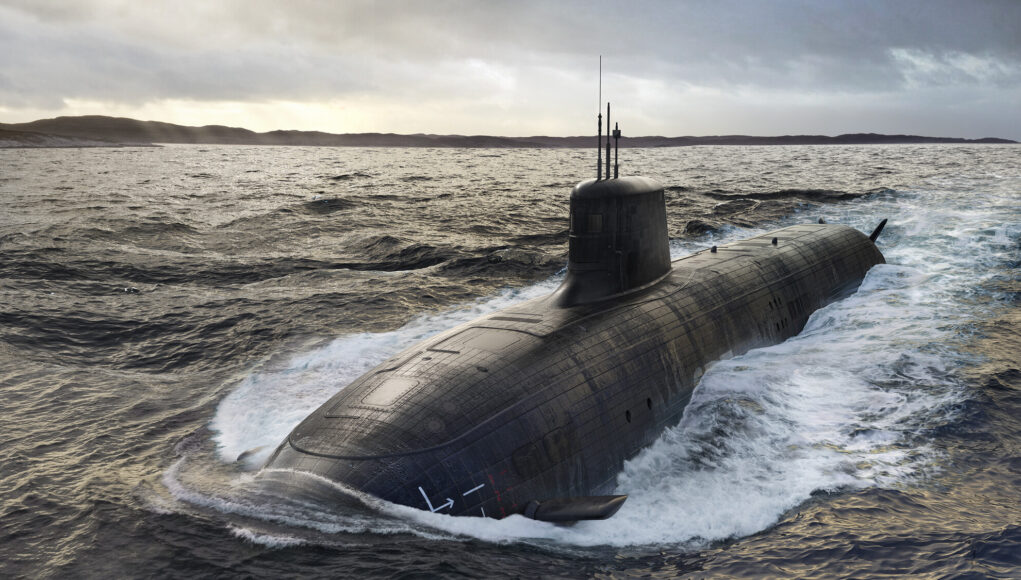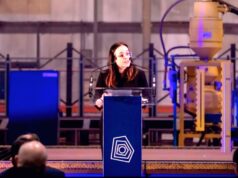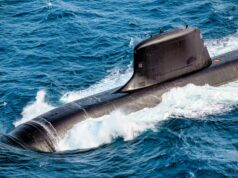Sir Stephen Lovegrove used a public evidence session to deliver his sharpest assessment yet of the AUKUS programme, telling MPs that the UK must “quite seriously accelerate” work at Barrow if it is to meet the late-2030s target for the first SSN-AUKUS submarine.
Lovegrove, now the Prime Minister’s Special Representative on AUKUS, said he had been given unrestricted access during his review and found a programme that remains strategically sound but under real schedule pressure. He reminded MPs that AUKUS is “colossal” in scope and the biggest UK defence collaboration in decades.
On the submarine pillar, he said productivity and funding have improved over the past year but the central challenge is unchanged: the UK needs the functional capacity to run two submarine production lines at Barrow while simultaneously building the deterrent boats. “Progress had been made, but not as quickly as it needed to be,” he said. His point estimates remain the late 2030s for the first UK boat and the early 2040s for Australia’s first hull.
He also highlighted the scale of Australia’s task, noting that Canberra must build an entire sovereign maintenance and construction ecosystem while preparing to operate the three Virginia-class submarines it will buy from the United States. He argued for deeper alignment between the UK and Australian systems to secure long term resilience across the nuclear-submarine enterprise.
On the advanced-capabilities pillar, Lovegrove said his review found “too many ideas” and insufficient focus. He recommended concentrating resources on a smaller set of trilateral projects. Proposals agreed with Canberra are now with Washington. The specific areas remain classified.
Lovegrove’s sharpest intervention was on governance. He argued that all three AUKUS nations had lost some central grip following leadership changes and the departure of key officials. He warned that if AUKUS drifts into a routine procurement silo inside defence ministries “we will all be in trouble”, stressing that the project requires sustained Prime-Minister-level direction. His appointment was one of several measures intended to rebuild that central coordination.
He also urged a stronger communications effort, saying public understanding remains limited in the UK compared with Australia. Because adversaries are actively targeting AUKUS with disinformation, he said the UK needs to explain its purpose more clearly to allies and domestic audiences. He pointed out that the programme is not solely about the Indo-Pacific and that it “radically improves and enlarges our deterrent capability in our own backyard” across the Euro-Atlantic.
Lovegrove framed AUKUS as a multi-decade project that will only succeed if political resolve is sustained. Asked whether he had been constrained by terms of reference, he said he had “absolute carte blanche” during the review and that ministers accepted his main findings earlier this year.














Let’s have a mmeting about the timescale of when we can get round to deciding on what to do about his comments subjecr to an MOD assessment of what to tell the politicians at some point !!!
You forget to put in the development group for the strategic framework.
We can possible dream of building anything without a strategic framework and several thousand power point presentations
Hold your horses Mr Speedy McSpeedyton! We can’t have a strategic framework without first having a thorough situational analysis of the operating environment involving stakeholders and industry!
Sorry Jim I forgot. Power point and “zoom” meetigs.
Zoom has an aura of speed….
Damn…wrong again. You’vr got it SB!
What about the meeting about what tea bags will be present at future meetings?
I think their is one monumental flaw in this programme, I think there is a massive risk that the USN will not sell 3 Virginia class SSNs.. I think their fleet numbers are just to small, the Virginia class are taking to long to build and the LA class are all walking out the door over the next ten years..( that is 50% of the USNs SSN fleet)..it has 23 LA class boats still in service the oldest to retire next year is 36 years old, the youngest is 30.. all in all it’s likely the LAs will be gone for 2032.. ( at the very very latest 35) and there are 24 Virgina class boats and it’s taken the USN 26 years to build that many.. see the problem.. by 2032 the US will probably have about 30-31 Virginia class boats and 3 sea Wolf class… for 33-34 boats.. it’s meant to have 66… this would all be sort of OK if china had not just build 8 SSNs in 3 years…upped its capacity to be able to knock out about 6 SSNs a year and started building a single reactor peer level SSN in the type 095.. it’s likely to have 2 of those build for 2030 and if it can serial produce 6 a year from 2030-3035 the USN is in the shit.. because the only advantage it had in an ever growing nightmare was its carrier and SSN fleet… so if in 2035 it has say 34 Virgina class and china has 12 type 093bs and 20-30 type 095s the USN giving nobody anything.
The three sold to Australia would be in South Pacific anyway, so it make no strategic difference if they are in RAN or USN.
It does to the USN, because will Australia be able to operate and maintain them as effectively
This is the same excuse being used to justify 3 Type 26s being handed to Norway instead of the RN. So with adequate training and USN support it shouldn’t matter.
The USN has the option to not hand them over, so they most likely won’t because they care more about americas interests than Australia
Well until the latest unhinged lunatic US administration came in. Australia and the US had the same goals in the Pacific.
And I think that is the fundamental truth.. America first means America only really.
I’m more concerned with Trump caring about Russian interests than even the USA, let alone his allies.
It does because Australia has no legal or alliance obligations to go to war with china if there is a U.S. sino conflict.. infact Australia may well decide to keep well out of it.
Then Lovegrove is even more right, because we’ll need to build a couple of submarines in Barrow for the Australians.
I agree, certainly under Trump they have a very low probability of getting any Virginia class boats, but who knows, the cheesy wotsit may wake up one day and have a revelation.
Are there Three Sea Wolfs , I thought there were only two ( Sea Wolf and Carter)and wont they be close if not at their end of life?
They have three, but one did her bow in against a Sea mount and is still under repair from memory, not back till late 2026 at best.
Mark, I think you may be thinking of USS San Francisco (the boat that hit the Sea Mount) – and she is a Los Angeles class boat.
USS Seawolf herself is 28 years old, and the youngest of the three – USS Jimmy Carter – is now 25
No the USS Connecticut also hit an underwater sea mount in 2021.. it was uncharted..which shows the risk of operating SSNs without very very good charts.
Trump loves ‘deals’ and selling things. He will 100% sell the Virginias, needed or not. The next democrat admin will more likely block it “Trump sold out capability America “desperately” needs!
USS Connecticut (SSN-22).. otherwise known as whoops.
I had the good fortune of being onboard Turbs when we thoroughly spanked the Connecticut and still got the T shirt. Fast but sounded like a bucket of bolts according to the sonar benders.
Still the best capability that the UK can offer to NATO by a country mile. It should be the second-highest priority RN programme following Dreadnought.
As I’ve said before, I’d rather see the surface fleet stay at 19 escorts, if it means 16 submarines can eventually be procured.
Edit: It’s also about the only survivable front-line asset the UK could offer in a Pacific conflict as well.
With Korea, Japan, Canada and Italy all looking at the possibility of nuclear submarines in the near future this could also be an area where the UK could position itself as ‘American technology, but not American politics’ as the more sensible alternative to trying to wrangle subs off the (constrained, as Jonathan says) US build lines. Of course, we’d still need to ask them for permission to share reactor tech but that might be more appealing to the USN than having to build the things themselves.
Alternatively RR Civil Nuclear has some interesting ideas for microreactors if we wanted a specialist export (hybrid nuclear-battery) design, the market seems big enough. It would become a bit like the Trident-Nightfall situation where we could then work our way up to complete independence if we really wanted to.
These ideas are slightly mad but I’m in a blue sky thinking mood this evening.
Ah, I see you’ve also given thought to the hypothetical JAUKORUS initiative.
I think the Canadians will swing the way of the Korean KS-III, which is probably as close as they can get to SSN capability without the problematic nuclear part. Korea though, and especially Japan (given the GCAP and F-35B collaborations), might be far more interested in the eventual SSN-AUKUS submarine. Though, I would be careful exactly how such a deal is arranged, to avoid the overcrowding that has sunk several other multi-national programmes, and to avoid leaking technology to the PLAN.
It’s fairly common knowledge that the PLAN got its start in pump-jet technology through espionage efforts against the UK, and it’s generally assessed that submarines are an area in which the PLAN still lags behind even Russia – though given the capability of the Severodvinsk-class subs, that’s not exactly a criticism that would be unsuited to any nation not the USA.
That seems about right to me, though it would be slightly odd for the Koreans to be exporting their own SSK while buying SSNs off somebody else.
We should be making better use of RR’s expertise. It feels like a complete fantasy, but if Canada, AUS and Japan all want decent numbers of their own nuclear submarines it might even be worth BAE and RR developing a cheaper and less US-reliant design specifically for export, with less risk of critical technology leaks. Their new Advanced Modular Reactor (which seems to have replaced the microreactor) is on the order of house-sized so would hopefully fit in a ~3-5000t sub while being fully UK-developed, but only produces 25MW of electricity. So it might be a good idea to collaborate with Japan to use their Lithium-ion batteries as a power reserve for sprinting, with the reactor recharging the batteries and providing hotel load. That programme design I would frame as an extension of GCAP, ie a bilateral programme but UK-led, and invite the Italians too (though they have their own reactor designs).
Then we would try to export to Canada.
Yeah, an AUKUS-light for customers makes sense to me – protect key technology, whilst enabling new SSN partners tied to the British system.
This method is typical of the Korean way of generating capability. First, they buy in a foreign capability (for example, F-35A). Then, they build as much as possible of their own aircraft, whilst buying in anything particularly tricky (KF-21 Block 1). Then, they work on those tricky technologies and eventually become independent (later KF-21 blocks).
It’s similar to the GCAP-light ideas, though without the tech security issues.
On a wider scale I think that an alliance of broadly anglophone and anglophile nations would be a good idea. Japan, Australia and Canada are all in a similar situation to us where we are just realising the mistake of overdependence on the US and trying to develop sovereign technology. The UK and Japan are linked by F35B and GCAP, UK and Australia are linked by AUKUS, while the King has a newfound political role as a guarantor of Canada’s independence.
As has already been made clear SSNs are the ultimate form of naval power, why not use that to form a group of powerful and independent democracies?
The Koreans are offering speedy delivery which is attractive. The RCN need these ships ASAP.
The !5 River class Destroyers are Canadian domestically built by Irving and will have a complete program by 2025. The world has changed since this contract was signed ( even then the time line was insane).
It is hoped that the Corvette/minesweeper replacement project for the Kingston class will be a multi shipyard build for speedier delivery.
Agreed, EASILY. The SSN is one of the Aces in our pack.
Absolutely. The aircraft carrier is often tossed around as the symbol of a great power, but I’d argue that the mark of a true global navy is the SSN. I believe that it’s the only capability currently exclusively found in the armouries of the five Security Council nations as well.
Should we be more like the Russian/Soviet navy, where the main role of the surface fleet is to defend and support the submarines? The QEs are Atlantic carriers, the T26s are Atlantic frigates, we could leave it there and then make a real push for 12 SSNs.
Well regards Russia, apart from launching airstrikes on the Kola moving into the Norwegian Sea, which Ark Royal was planned to do if it went hot in the Cold War, I don’t think our surface escorts are headed that way into the Barents. Why should they? Escorts for GIUK, Subs forward.
One reason why lack of an SSM on our ships hasn’t been my greatest worry, though goid they putting NSM on now, eventually. Ships are not lined up lobbing them at each other in the GIUK or Barents.. We need air power and subs for that. So I agree with the emphasis on the SSN.
A Carrier, it’s aviation, and SSN are the true sea denial capabilities, the Escort force does just that, escorts and hunts subs.
The third and fourth pillars of a Navy for me are the support ships and the amphibious side, but we’ve gone and gutted those.
Yep essentially escorts on their own don’t allow for sea control.. you need the carrier to control the air.. then the escorts allow for surface dominance and with air and surface dominance your SSNs can dominate the sub surface.. but if you loss the subsurface or air your surface fleet is in a pickle..but essentially to fully dominate you need a carrier and it’s airwing snuggled within a large ASW and AAW escort group ( 6-8) and that will allow air and surface dominance..your SSNs then have utter freedom as they cannot be hunted from the air.. it’s why the true nightmare for Russia would be a strong UK carrier battle group sitting in the high north.. just outside its bastions.. because it would loss air control of its bastions and at that point the RNS SSNs can do nasty things to the bastion…. The only thing it could do would be to attack the carrier battle group with its strategic air and SSNs.. essentially throwing its own irreplaceable assets against the concentrated strength of the RN.. instead of being able to nibble at the UK with small safe incursions.
But for that to work the RN needs to be able to generate a truely nasty CBG.. that’s 3-4 squadrons of F35B.. 2-3 T45s and 3-4 ASW frigates supported by 2-3 SSNs and an on duty AEW strategic air platform, constant P8 support and constant air to air refuelling support.if we can also throw some long range ground based land attack missiles Russian infrastructure in the north it would be just evil on Russia. really generating that in the high north should be the UKs goal.. because of we can do that Russia is not going to want to play with us.
I think that’s the way things are trending. The RN is returning to its mid-Cold War posture, with a focus on ASW and occasional limited expeditionary operations. I don’t think it’s necessarily a terrible idea.
I’d use the Type 31s as overseas-deployed flag-fliers. Put two in the Pacific, one in Bahrain, one in the Med and one in the South Atlantic. Use them as beefier OPVs, and market the shit out of them for recruitment. The full ‘see the world in a modern, comfortable warship’ route.
Keep the carriers in the North Atlantic, except for quadrennial trip to the Pacific, which could continue. Same with the Type 26 frigates, and the destroyers. Bring the OPVs home, use them for escorting vessels in and around the UK.
Then, I’d really push the submarine force forward. In the near term, push for two-three out of the seven active or ready to sail at any one time. Two in the North Atlantic, one in the Pacific or With the CSG. Later, with 12 boats, you could expect maybe 3-5 deployed, perhaps more with improved infrastructure. Put three in the North Atlantic, one in the Med/with the CSG, and one in the Pacific. If more can be mustered, send them to the Pacific.
Probably some obvious flaws there, but that’s how I’d achieve NATO-first, but without abandoning the rest of the world.
I like your spread of T31s. If they ordered 3-5 more (Babcock’s MRNP variant? maybe they could replace or complement the 3 B1 Rivers’ in around the UK and an additional one fof Bahrain/Suez area and be given some MCM/ASW capabilities.
Does the Russian surface fleet defend & support the Russian subs or just end up joining them?
Which we cannot maintain or keep at sea
Thanks for your contribution bud. You think I’m unaware of the availability crisis?
Getting sliightly annoying now.
Irrelevant. Shoreside needs fixing, sure. When the backlog maintainence wise is fixed the SSN remains a capable asset few have. Are Russian SSN bursting with availability?
Russians have more of them and care far less for safety concerns.
Even if we fix our infastructure issues which we arent really. 1 dock for astutes in devenport, shiplift kept busy with Vanguards and floating docks nowhere in sight, the Astutes in general have had a littany of issues that they will never be high availability.
It’s also the very best way the UK can hurt Russia hard..
I still think we need 30 surface combatants as well because we as an island and for our wider geostrategic needs need to do sea control and sealane security.
We need 9 AAW and 9 ASW escorts to generate 3 deployments of each for a CBG and amphibious group. We then need 12 second line GP frigates for 4 independent deployments for sealane control.
The weakness of SSNs is navies are the one force that also has essentially a full time day job outside of kinetic war.. and SSN are the heavy fist of death and not the subtle hand of maritime power.
It’s absolutely the UK’s best conventional way of sticking Russia where it hurts, and the Russians know this. I don’t know how much you keep up with the Russian-backed/controlled media, but whilst much of the RN surface fleet is frequently rubbished for their technical defects and limitations, the Astute-class are criticised only for the fiscal and time-based issues the programme has faced, as opposed to any criticisms of capability. In fact, there are occasional acknowledgements of the A-boats’ areas of technical superiority, with non-acoustic tracking and detection systems (pioneered by the Soviets) being an example.
I agree that 30 escorts would be great, but I don’t believe its realistic, even considering a funding uplift. 24-25, perhaps, is more achievable, if production of the Type 31 is simply continued in order to prevent the closure of the yard, but in that case, I imagine we’d see earlier ships of the class being sold on the cheap, rather than actual additions to the fleet. The RN is entering a period of particular fiscal strain, what with Dreadnought ramping up, MRSS, FADS and SSN-AUKUS all beginning in earnest and the frigate programmes continuing. I don’t see further escorts also being possible (heck, even the current state of play may be untenable).
We know the Batch 1 OPVs will soon leave service, and that some of the Batch 2s will then be brought home to replace them. In my mind, the move might be two order 2-3 extra Type 31s, but with just the 57mm gun and the two 40mm. Lose the CAMM, lose the planned NSM, and run them as large patrol frigates or OPVs, that could then be rearmed rapidly in the event of conflict. That way, you get a slight increase to the fleet, whilst trying to reduce immediate costs.
I honestly don’t see 30 escorts as that much of an issue build cost or running costs wise.
I’d beg to differ in the wisdom of having anything without full self defence baked in so CAMM is, to my mind, essential.
Given the procurement cycles are years having NSM around in a warehouse is essential.
I agree stick with 57/40nm combo.
Its absolutely an issue, running cost incluides crew which we do not have. The RN has been directed to take control of the MRSS when they come into service so where are you getting extra frigate crews?
Set challenges and plan for solutions Hugo.
Recruitment and retention are much better now.
If RN orders soon it still has the best part of 10 years to generate crews.
Theyre not going to order soon its as simple as that, how much URGENT orders should we be placing and havent, MRSS and MCM are both ahead in the queue, there is no cramming some frigates in there too.
Clearly you’ve never run a production line!
T31 is a hot line that is skilled up and will be running at optimum producing GP+ frigates.
As Babcock have said they have plenty of space to make ships such as the dry dock with Goliath that was used to assemble QEC.
Not that long a go there was one monopoly supplier at BAES now there are three credible suppliers.
It is perfectly possible to increase capacity and sell things off hit lines as BAES has done with T26.
You’re saying we should order frigates just to keep the line open that have no guarantee of being sold and that we cannot take on.
And you want a frigate better than T31 when under our current funding scheme T31 is getting 12 CAMm missiles…..
Babcock will have to find other work, there is zero chance judging by the recent SDR of more frigates
I am not saying that at all.
A 24 combatant navy is absolutely consistent with SDR.
As I have said quite a number of times previously I think it is most likely that MRSS will get moulded into the T32 project so it will be a hybrid combatant. For raiding close fires support is needed and that needs kinetic effectors.
Babcock are also very confident of selling many more T31s and it is much easier to sell something that is in current production.
Where in the SDR does it refer to 24 combatants or an increase in frigates, only thing weve heard since are automated platforms like T60s
MRSS is looking to be a 40 thousand ton amphib, not a close to shore support vessel. Not a T32 like either, if we can afford it maybe it will defend itself but it wont be doing escort duties.
Babcock are hyping themselves up but theyre going to go elsewhere.
There escorts numbers are great and ok by us here on ukdj but would the “experts” at MOD agree or even think like this? Seems like the rule of 3 is not really a guide for ordering. I think keeping some level of CAMM or Martlet would still be useful and NSM ffbnw. The BAE Leander was quite a fighty design at 117m but maybe too small hangar/flight deck.
With the CIP on the T31s. Does it have to be 4x mk41s? Why not a hybrid mix of CAMM farm (forward/rear) or ExLS and 2-3 Mk41s? Any spare 3rd/4th mk41s can be spreadout to other ships MRSS/T32 or whatever or not even ordered to save a few quid. Even the 2x40mm, are two needed when paired with 57mm and CAMM? Potential of 5 spare 40mm there, carriers and B2s anyone?
This just sounds like a bodge list, why would they do any of this. We dont even know if and when the T31 will get Mk41 so how can you talk about sharing them around hodge podge like.
The RN have very happily hogpogged large frigate classes previously. The type12 improved had a SeaCat/ gun/ lkara type for ASW, Exocet/gun/seacat for ASuW, seawolf, Exocet for a good GP frigate and a gun only patrol.. France and Italy have changed the FREMMs as and when they needed a different type of frigate built and the Italian PPA is configured from patrol to ASW and AAW.. nothing to stop the RN bodging whatever they fancy or can afford on the T31 hulls that’s the point of big…
The type 12 were old frigates desperately making up for lacking capabilities. France and italy have not bodged anything they have upgraded ships or replaced them with new builds like Italy and the system intergration is seamless. The PPA was a frigate without the extras and now its recieving them.
What that comment suggests is slapping mk41 every which way for whatever reason, we need to upgrade Mk41 to make it a credible frigate not slash its capabilities even further and have a massive patrol boat which we might as well have not built.
I think what the commentator was saying is you can have a T31 fleet with different capabilities.. the PPA is a classic example the Italians essentially built it to three different levels as as budget allows they have upgraded the lowest level.. so
Paolo Thaon di Revel and Francesco Moronsini were built with a patrol frigate configuration 127mm gun, 76mm gun and 2 light guns.. it will be refitted to a full fat AAW and ASW frigate (long range AAW missiles, strike missiles and TAS
it’s built or building 2 others to the full configuration and 3 others as a GP frigate version without as much ASW or land attack ASuW capabilities..
So knocking out a base variant with CAMM, 57mm and 2 40mms and then upgrading to different levels of capability as money and need dictates.. we may want a beefy version with deep silos to sit with a CBG or littoral response group and 32 Strike length MK41s would be ideal.. but the RN may also want a solid escort version for supporting sea control.. so 36 CAMM ( of various types ), with deck launched NSMs and a thin line towed array.. or it may want a patrol frigate and presence vessel and just keep it as the base guns and 12 CAMM.
And you say we don’t want a patrol version of the T31.. why not.if they can get a crew down to 50 it can in the end go on to replace the RNs OPV fleet.. its idea because it will be able to carry a ton of autonomous systems.. and if we ended up in a peer war ( which may last years.. because china has not intentional of fighting a quick war if one starts) you can refit them at speed to either replace losses ( which you will need to ) or expand the fighting fleet..
Personally I would like to see the RN will a lot of type 31s of whichever capabilities because it gives it possibilities.. you can turn a type 31 into any type of frigate you want ( apart from the truely high end ASW ).
Were not replacing the OPV fleet, so why would we end up with OPV variants of T31, there isnt the appetite or the backing to allow us to keep building T31
Hugo Hugo…..3 dimensional thinking mate and not black and white…We will be replacing the OPVs.. Hugo ship building for a navy is about thinking 10-20 years in the future.. not today..today is what someone did or did not do 10-20 years ago… by 2035 the rivers 2s will be 15-17 years old and their replacements will need to be ordered.. so someonr should have a thought now on what that will look like and what shipbuilding capacity is needed and how it fits with wider capacity demands..the reason the RN is in the utter catastrophic mess it’s in now is because the political classes stopped planning for the next 2 decades..
I am thinking in decades. T31 production will finish around 2030, B2 OPV replacement will be pushed far down the road as the B1s has been (and then not replaced) a 5 year gap on T31 production isn’t going to work so Babcock is going to have to do something else
Nog bodgy at all. Just being pragmatic. The T26 has a hybrid mix of CAMM farm and Mk41 so reason why the T31 can’t do the same, maybe with a reduced farm of 24 like the T45s, same. Obviously with 4 mk41s its better. The RAN here has just ordered 11x Mogami with 5″, 4xmk41 and RAM and Seahawk. Compare all that with the T31?
What about seabed warfare? It wouldn’t be too difficult for SSN-AUKUS to have a dive lock and/or use the payload tubes for ROVs and the like, then use our SSNs to play sneaky tricks on the Russians.
Or as I said to Leh above it could be interesting to build a ‘second-rank’ SSEN class more suited to special forces and seabed stuff.
Blue sea thinking, surely?
Firstly Stephen Lovegrove is not your atypical Civil Servant he actually had a proper career before he was headhunted into the CS which if you do some research his achievements are rather impressive.
Secondly someone needs to point out the fact that as the USN can no longer go toe to toe with China on its own it actually needs its Allies on board to support !
Fun fact other than the Invasion of Grenada and a war with lame duck Spain (US empire building) the US has NEVER WON A WAR ON THEIR OWN !
I doubt they teach that any US School 🤔
It’s bizarre to me that people cannot see that within a decade the PLAN is very likely to eat the USN alive on any sea or ocean on the planet that is not within close proximity to US territory.
They did win the American Civil War, but that was a damn close run thing!
Maybe a silly question bit why late 2030s for the UK. Can’t they bring this forward to mid 2030s? Could they product a “Astute+” as a bit of a go between the Astute and SSNRs? Or even purchase 4 SSKN’s to be built asap to get sub numbers up sooner and free up the Astutes?
Some of the Astutes are still quite modern, with the final boat set to enter service only a decade before the planned start of construction for the first SSN-AUKUS. That said, the other reasons that they probably can’t bring construction forward are that space is needed to build the Dreadnoughts, and that beyond that, construction has technically already begun for the first SSN-AUKUS boats. The confirmation that Babcock had begun work of long-lead-time items for the first submarines was given back in June of this year, and both BAE and RR were also given contracts to begin actual design and development of systems for the boats this year. We might just be at the point that its now too late to bring them forward – they’re already as far forward as timelines allow.
I think that an Astute+, or an SSK would run into the same issues of space and availability of places to build them.
It’s a real shame that subs can’t be built elsewhere or mukti-site in the UK simultaneously. Lack of fore-site (pun intended) maybe. Bottlenecking production options which don’t really just have to be “nuclear”. Lots of useful SSKN designs around even the BMT Vidar which I had assumed could have been built locally. As TJ said if UK plays its “sub cards” right there could be further export potential here. It’d be good to get some sales on Spearfish and NG Stringray.
There is no point in another submarine site to build a handful of SSKs, what will it do after
It can build ships or blocks of ships afterwards!
In hindsight an 8th Astute would have been a smart choice.
Okay I’m going to say something really stupid..
Can any of the reactors from all those recommissioned subs lying around be recycled-recommissioned and built into a new sub?
No, theyre all out of fuel
Yes, thats understood. My next question then is, if they can be refuelled and reused? Do the nuclear reactors have a shelf life that could be extended for re-use ?
It’s not plug and play – they are old, complex, the fuel as Hugo says is no longer viable to power a boat, there is too much neutron embrittlement, and other issues of 30 years of wear and tear. They are also from a totally different plant design: PWR1 Core Z – Trafalgar class at least – and those are the most recent – so utterly different shape, size, physics, everything. In brief they are shagged and just plain wrong.
At the rate of build (too slow) it would have got in the way of Dreadnought.
The only way the UK will fund the AUKUS subs is to increase taxes or cut benefits. The Aussies are in the same boat no pun intended.
Just hope the UK and Aus governments seek and get good value from all vendors and hold them to account. I guess the US will do what the US does. Personally there’s any whiff of a massive delay orveven a no go then I’d like to see the RAN get some more SSKNs to complement the current Collins. But to their credit they’ve ordered big on the Mogami’s and proceeding with building a fleet of GhostShark UUV. Someone’s paying for it? Us!
7 SSNA and 7 SSK/SSP. Cheaper, better force mix for tasking, less reliance on RollsRoyce and BAE (we buy the SSK/P from an ally), more flexible basing as no nuclear license required. I could go on. How about it also increasing the professional gene pool for the SM flotilla too? It’s tiny now and retention is poor.
if we dont increase our number of SSN then the industry will crash again
Hi Hugo. That isn’t really the case. The issue here is throughput at the yard. Barrow crashed last time because of the hiatus in ordering after the V Boats by the Govt (not MOD: it does what it is asked to by politicians, in the way that politicians have them do it), which caused a precipitous decline in the Barrow workforce. I’m simplifying a complex series of events, apologies for that, but throughput is the issue: if we have boats being built continuously, the yard is fine. As a coda the only way we could build SSK/P in UK is to stand up a new UK yard or expand Barrow, neither of which I see happening. There are some stunning allied designs out there – we should go get ’em. Best wishes, Mister Whippy.
The last 2023 equipment plan showed that funding of nuclear accounted for over 38 % of the.total.
If Lovegrove thinks more is needed, how can it be funded , given the in year shortfall of @£2b?
At some point, the whole project may be at risk given the modest commitment to increase the defence budget.
12 SSNRs sounds very ambitious. Does the UK truly need that number? Would 9-10 suffice maybe if a small fleet of 4-6 SSKN’s was added into the sub fleet mix?
Going to say the same with the 6 MRSS. Does the UK need 6, or can it split 3/3 with a larger Tier 1/smaller tier 2?
Would any of this help to reduce projected costs but the RN still get a credible mix of force projection capabilities?
I’m afraid most of this SSN-A vision is and will turn out to.br just pie-in-the-sky. Every matelot on here seems to turn a Nelsonian blind eye to.the hard realities of UK defence, viz:
1) There is no spare money to build a mega fleet of new SSNs. The projected increase in the core defence budget from 2024/5 to 2028/9 is £13.3 bn or a 22% increase. Inflation at the current rate will total 18.5% but of course a lot more as it is compound. There is no way the Treasury will be able to fund procurement inflation. So basically, there is no real new money over the next 3 years and who would predict what the next tax-cutting, benefit increasing or Russian toadies lot will do to defence.
2) Even if we ever get.to 3% or 3.5%, there are many higher priorities than fielding 15 SSNs.
Air defence is critical in this new missile and FPV drone era. We have.no GBAD in the UK. The army is getting about a quarter of the Sky Sabres needed to cover our 2 divisions. It has no mobile low-level air defence (LLAD) or counter-UAV (C-UAV) capability like the Sky Ranger. We are projected to have just 107 air defence Typhoons, which is dangerously slim.
Unmanned.systems are going to be critical too but we as yet have very little in the way of UAVs and are just starting.on UUV development.
These are both far higher priorities than £1bn+ SSN-A boats, as are purchasing new AEW aircraft, providing adequate field artillery for the army, which is now bereft of same, increasing service numbers to man the new weapons coming into service. The list of priority needs is long, expensive and overdue.
There is a clear strategic plane too. Any conflict with Russia will be a predominantly air-land one, fought in Eastern Europe and needing.all 30 NATO Europe members to step up to the mark. It will not be a great naval contest, as ENATO greatly outnumber the Russian fleet..But here in the UK, the naval lobby.is always vociferous and pushy to put the RN first. From what little new money defence will get, we have grand plans for.this questionable.Atlantic Bastion plan, with its array of T91 and T92 unmanned vessels, plus additional weapons for escorts plus umpty future SSNs.
All on.top of 4 ruinously expensive.Dreadnought SSBNs, a mega build of 13 new escorts plus MRSS, Castle MCMV-MAC, Proteus, MRSS, replacements for Scott and River 1, the list is endless and the ambition to get most of the above delivered or underway in the next 10 years completely unviable financially.
We are never going to be able to afford a cutting-edge, timely Tempest if the budget is once again largely swiped by the RN
All this to say that, if Sir Stephen and the RN.want anything like 15 AUKUS SSNs, they better come up with some whizz scheme to sell the public war bonds or debentures, ‘cos there isn’t the money in the core defence budget to fund the RN’s wishlist and what there is is needed for rather higher defence priorities
The RN is in a disastrous state currently and youre accusing them of swiping the budget?
Yes.
Shock and horror, that an island nation should put the Navy first.
We shouldn’t need an army presence in eastern Europe. If Poland, Sweden and Germany can’t defend the Baltics then our own contribution is meaningless.
SSNs are the means by which we can oppose Russia at sea. Those and GCAP are our main peer-war combat power so we should commit fully to both of them (that means 12, not 15).